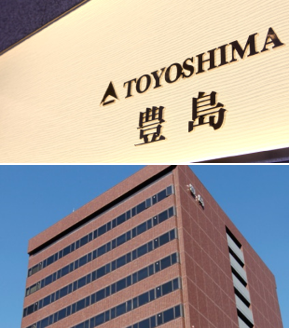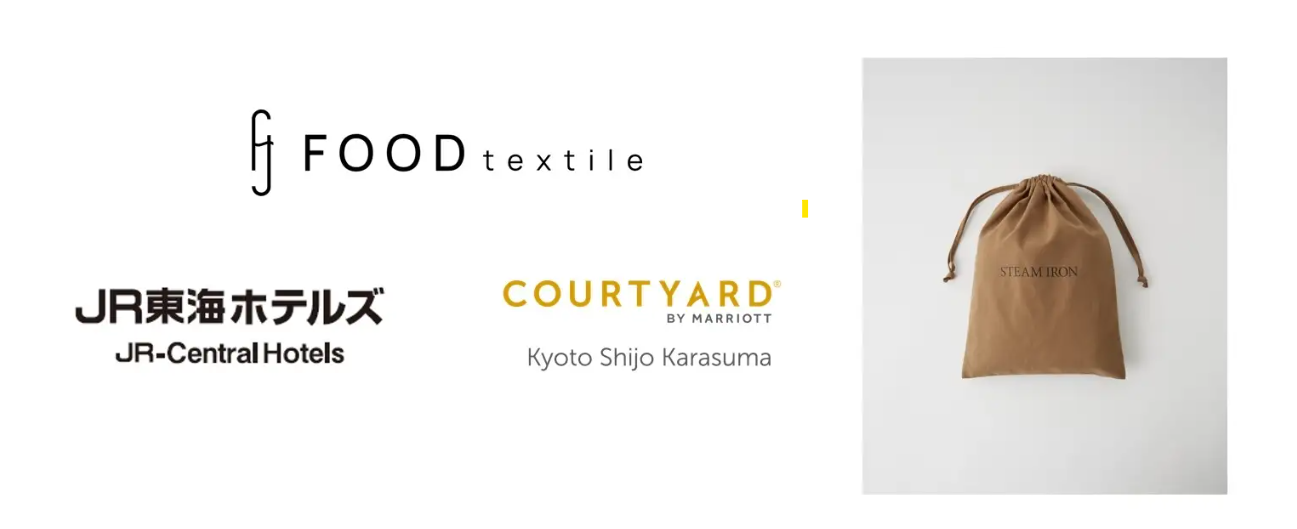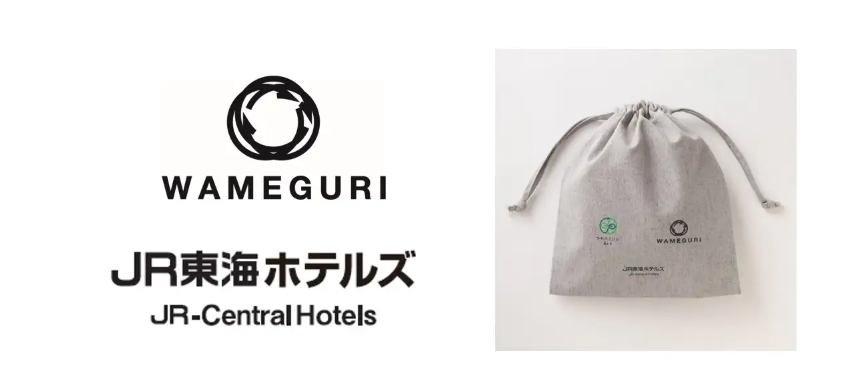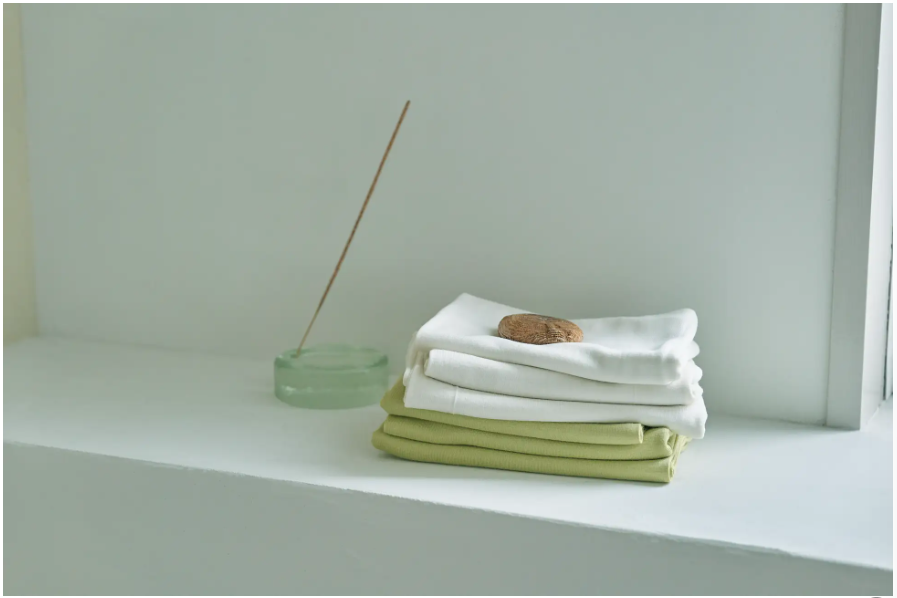【Survey Background】
The results show that more than 70% of consumers want to embrace eco-friendly fashion. At the same time, about 70% of respondents answered that the image of companies and brands that incorporate environmental considerations will improve. In recent years, awareness of the sustainability of the global environment and society has increased. Amid the spread of various initiatives in the apparel industry, we conducted a survey on consumers' awareness of environmental considerations, awareness of sustainable fashion, and their intention to use it in conjunction with the United Nations SDGs Week, which begins on September 22.
【Summary of Survey Results】
◆30% of people do not care about "trends" and "brand names" when choosing clothes and fashion
◆About 50% of people understand the social issues in the fashion manufacturing process. "Working Environment and Wage Issues" is an area of interest
◆The most familiar sustainable material is organic cotton. Recognition rate is more than 70%
◆More than 70% of consumers answered that they want to adopt environmentally and socially friendly fashion, and the reason for this is that both men and women have a high "social contribution", but men in their 20s ~ 30s tend to have a higher ratio of "self-expression" than women.
- The point of choosing fashion is "design" and "price", and "environmental friendliness" is 5%
- About 30% tend not to care about "fashion" or "brand name"
Q Please choose points that apply to you when you usually choose clothes and fashion. (Multiple answers, n=1089)
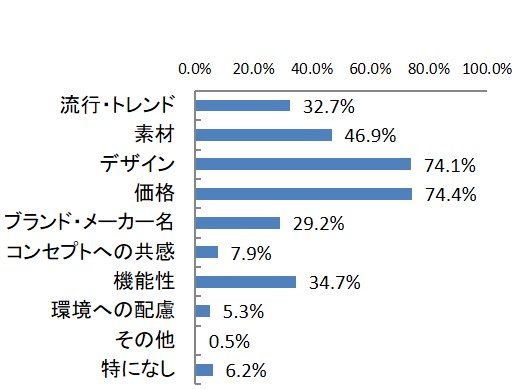
Q Please select a point that you no longer care about. (Multiple answers, n=1089)
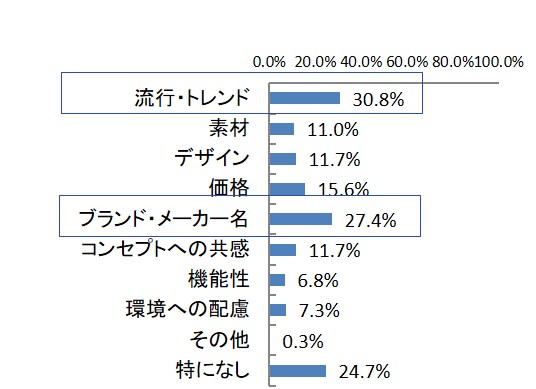
- About 50% of people understand social issues in the fashion manufacturing process
- The area of most interest is "labor environment and wage issues"
When asked what they knew about issues in the manufacturing process of fashion products, 69.4% answered "work environment/wage issues," the highest percentage, andabout 50% of all respondents were aware of social issues related to fashion. I found out that Also, the percentage of people who think that "marine pollution" should be solved is about the same as "animal cruelty". is spreading. On the other hand, the value of "soil pollution" is relatively low, and it is thought that the relevance to fashion is not recognized compared to other items.
QWhich of the following challenges in the manufacturing process of fashion products is the one that you have known about for some time? (Multiple answers, n=1089)
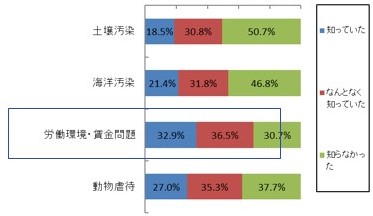
Q Also, please select one that applies to the problem that you think should be solved in particular. (single answer, n=1089)
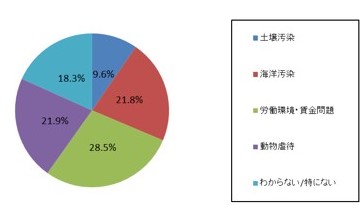
- The most familiar and sustainable material is organic cotton. Recognition rate is over 70%
- Focus on recycled fibers and animal-free materials
In terms of materials that people would like to purchase and use, following "organic cotton", about one in three people said "recycled fibers" such as recycled polyester and recycled down, and "animal-free", which does not use animal hair. It was found that there is a high interest in other materials, such as "Materials" being selected.
QWhich of the following are you familiar with as an initiative to solve these challenges in the manufacturing process of fashion products? (Multiple answers, n=1089)
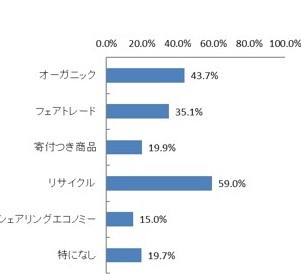
Q Please select a material that you are familiar with from the list below. (Multiple answers, n=1089)
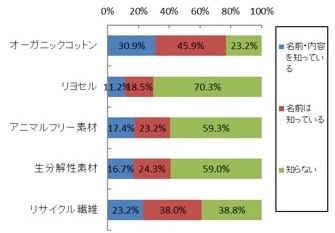
QWhat kind of sustainable materials would you like to purchase and use? (Multiple answers, n=944)

QWhat do you know about organic cotton? (Multiple answers, n=836)
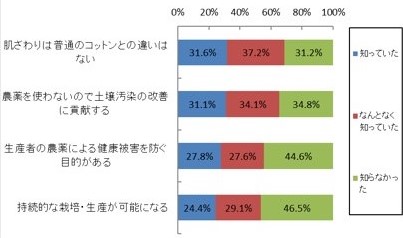
・More than 70% of consumers want to adopt environmentally and socially conscious fashion
When asked if they would like to adopt fashion that considers the environment and society, such as ethical fashion and sustainability, 19.2% answered “Yes” and 52.4% answered “I think so”. What more than 70% of people want to adopt
Also, when asked about the reason, following "because I am interested in contributing to society", followed by "because of self-assertion and expression" and "because of trends". It was a result that it can be seen that it is spreading. I understand.
QDo you want to incorporate fashion that considers the environment and society, such as ethical fashion and sustainability? (single answer, n=1089)
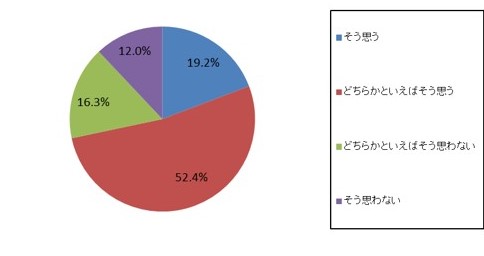
Q: I have a question for those who answered yes. Please select the reason that applies to you. (Multiple answers, n=780)
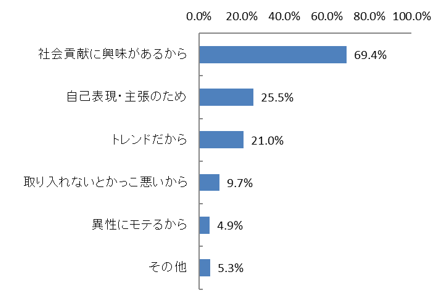
- “Social contribution” is the most common reason for wanting to adopt it for both men and women
- Men in their 20s and 30s have a higher percentage of “self-expression”, and there is a difference in gender trends
Q: I have a question for those who answered yes. Please select the reason that applies to you.
(Multiple answers, male N=392, female n=388)
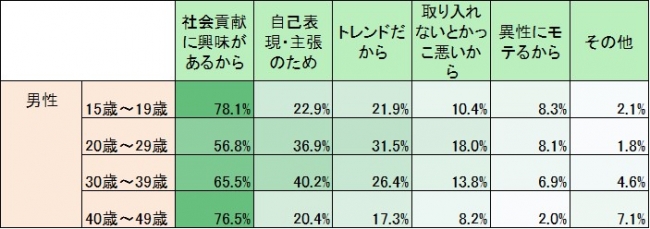
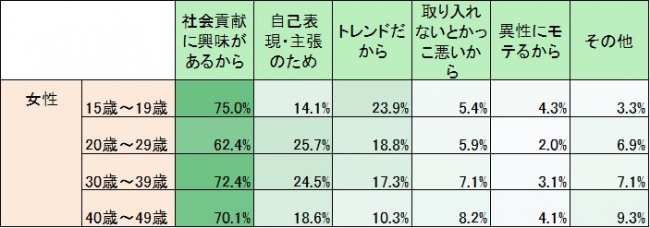
- Eco-bags are the most familiar eco-friendly activity
- Approximately 30% answered that the environmental awareness of their surroundings was “increasing.”
When asked about the ecology they are working on in their daily lives, More than 60% of respondents chose to use eco bags, the highest to numeric values. This was followed by "refill items" and "frequently turning off the lights". As for recycling, "PET bottles" accounted for 44%, while "clothes" accounted for a low level of 24.2%.
In the previous question, where we confirmed our efforts to address issues in the manufacturing process of fashion products and the state of awareness of textile materials, about 60% of the respondents answered that they knew about "recycling" and "recycled fibers." Discrepancies between perceived status and actual efforts has come to the fore. In the background of this, while there are places and opportunities to purchase recycled products and recycled material products such as stores and EC, individuals Lack of places and mechanisms for recycling clothing on a daily basis is thought to be in the background.
In addition, regarding the question that environmental consideration is increasing in your surroundings regarding fashion in recent years, Approximately 30% of respondents answered that they are “increasing” Did.
QPlease select the one that applies to you in your daily life. (Multiple answers, n=1089)
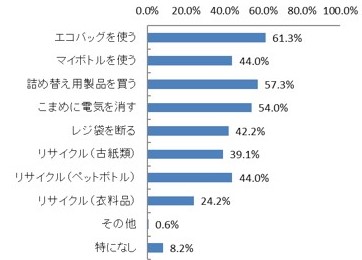
QDo you feel that people around you are becoming more environmentally conscious about fashion in recent years? (single answer, n=1089)
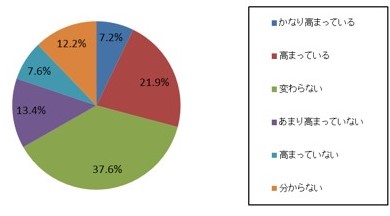
・Approximately 70% answered that the image of companies and brands that incorporate environmental considerations will improve.
When asked about their thoughts on future fashion purchases, the highest response was "purchase only the minimum necessary items". This was followed by “low-priced products,” and “choosing environmentally and socially friendly products, even if they are expensive,” was at the lowest level.
Also, if you learned that a brand or company is using eco-friendly materials, would your image of that company change? Approximately 70% of the respondents answered that the company's image would improve, indicating that consumers are highly interested in corporate activities.
QPlease select the one that applies to your thoughts on future fashion purchases. (Multiple answers, n=1089)
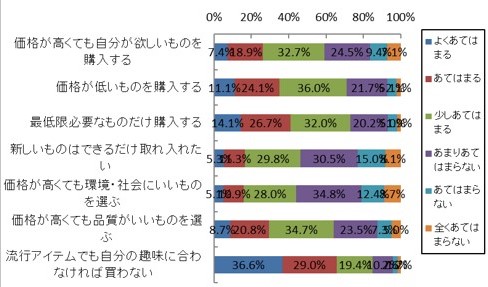
QIf you find out that a brand or company uses eco-friendly materials, will your image of that company change? (single answer, n=1089)
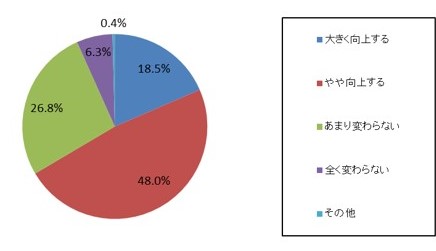
[Survey overview]
・Survey method: Internet survey
・ Survey target: 1,089 men and women aged 15 to 49 nationwide
Buy your own clothes at least once every six months
・Survey period: August 8, 2019 ~ August 27, 2019
[Reference]
The survey results revealed that many consumers are aware of social issues related to fashion and want to adopt fashion that is environmentally and socially friendly.
In addition, in terms of eco-activities that can be undertaken on a daily basis, a gap was found between the recognition status and the actual status of recycling in the clothing field, and it was seen that there were few places and mechanisms to practice it on a daily basis.
The TOYOSHIMA consists of organic cotton "Orgavitz", dyed material "FOOD TEXTILE" based on waste food, and recycled fiber "Tencel" We are developing sustainable materials and brands. Going forward, we will continue to promote sustainable corporate activities, such as the development and sale of products that are socially and environmentally friendly.
◆About TOYOSHIMA
Founded in the Edo period, handling everything from textile raw materials to products
Founded in 1841. With the cotton merchant as the founding business, the first Hanshichi Toyoshima was the shop name "Wataya-hanshichi", Aichi Prefecture The Toyoshima & Co., Ltd. began when we started a textile wholesaler in Ichinomiiya.
In our history of more than 170 years, we have expanded our business domain in response to the changing times. Currently, we are engaged in a series of processes from purchasing and selling raw materials, yarns and fabrics from all over the world, and final product planning to production management and delivery, and are developing our business comprehensively in all processes of the Japan fashion industry.


◆Toyoshima & Co., Ltd. Overview
・Representative: President & CEO Hanshichi Toyoshima
・Line of Business: Wholesale, import and export of various textile products, trilateral trade, etc.
(Materials such as cotton and wool, raw yarn, textiles, products, etc.)
・Head Office: Nagoya Head Office Naka-kuNichiki 2chome 15-15, Nagoya-shi, Aichi
Tokyo Head Office 2-1 Kanda Iwamotocho, Chiyoda-ku, Tokyo
・Overseas offices: 14
・Number of employees: 574 (male: 332, female: 242)
*As of June 30, 2019
・Official website: https://www.toyoshima.co.jp/
